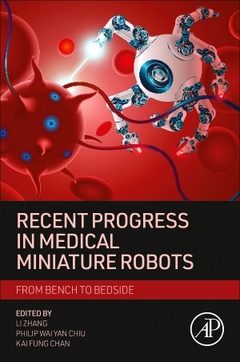Recent Progress in Medical Miniature Robots from Bench to Bedside
Coordonnateurs : Zhang Li, Chiu Philip Wai Yan, Chan Kai Fung

Recent Progress in Medical Miniature Robots: From Bench to Bedside serves as a specialized and dedicated reference on tethered miniature robots and their related collective behaviors. The book presents the latest achievements in the research of miniature robotics and introduces a variety of miniature robots on the milli-/micro/nano-scale, with tethered/untethered and individual/swarm designs, describing the various types and analyzing the underlying principles per class. Clinicians, academicians, healthcare professionals, researchers, students, engineers, and scientists working in the field of medical miniature robots and related biomedical applications will benefit from the knowledge presented in this book. Robotic technology helps the medical field realize new surgical procedures and medical treatments that were previously unachievable. Innovative technologies like medical robotics will continue to improve the performance of minimally invasive interventions, allowing more accessible surgical treatments. With the advancement of robotic technologies across the scales, novel robotic-assisted surgical procedures and therapeutic interventions are revolutionizing medical diagnosis and treatment solutions, which enable and enhance visualization, accessibility, and accuracy for surgeons to carry out minimally invasive interventions that benefit medical doctors and patients worldwide.
Part 1: Tethered Miniature Robots 1. Flow-assisted and flow-driven microcatheters 2. Magnetically controlled continuum miniature robot: design, control, and application 3. Magnetically actuated continuum robots for vascular interventions Part 2: Untethered Miniature Robots - Individual 4. A rotating magnetic gradient field-based drive system for microagent control in targeted therapy 5. The future of microrobotics in gynecological applications for the diagnosis, treatment and prevention of Asherman Syndrome 6. Design and Fabrication of a Magnetic Actuation Miniature Soft Robot for Biological Sampling 7. Functionalization of microrobots for biomedical applications 8. Clinical imaging of miniature robots in relevant biological scenarios Part 3: Untethered Miniature Robots - Swarm 9. Magnetic microrobots from individual to microswarm steering 10. Medical microrobots for in vivo assisted reproduction 11. Untethered microrobots for minimally invasive removal of blood clots 12. Micro-/nanorobots for combating biofilm infections Part 4: Microrobotic Platform 13. Title tbd 14. In Vitro Diagnosis via micro-/nanorobotic platform
Philip Chiu is currently professor, honorary consultant, and head of Division of Upper Gastrointestinal and Metabolic Surgery, Department of Surgery, Prince of Wales Hospital; director of Multi-Scale Medical Robotics Center; director of CUHK Chow Yuk Ho Technology Center for Innovative Medicine and associate dean (External Affairs), Faculty of Medicine, The Chinese University of Hong Kong. He also serves as director of endoscopy at the Prince of Wales Hospital and the New Territories East Cluster, Hospital Authority, Hong Kong. Professor. Chiu is the first in Hong Kong to perform endoscopic submucosal dissection (ESD) for treatment of early GI cancers, pioneered world’s first robotic gastric ESD, as well as the first robotic colorectal ESD in 2020. His research interests include minimally invasive robotic esophagectomy, novel endoscopic technologies for diagnosis of early GI cancers, endoscopic surgery, as well as robotics for endoluminal surgery.
Kai Fung Chan is a research assistant professor in the Chow Yuk Ho Technology Centre for Innovative Medicine and a research assistant professor by courtesy at Peter Hung Pain Research Institute at The Chinese University of Hong Kong (CUHK). Dr. Chan received his Ph.D. degree in Biomedical Engineering from CUHK. His research interests include medical miniature devices, micro-/nanorobotics and translational medicine. He is also a co-founder of two
- Provides authoritative coverage of the fundamental research and medical applications of miniature robotics, from mm-scale to nm-scale, and with tethered/untethered and individual/swarm designs
- Focuses on state-of-the-art research and up-to-date results of medical miniature robots
- Describes the key medical applications of miniature robots and provides insights into ongoing research
- Speculates on the future directions of medical miniature robots
Date de parution : 09-2024
Ouvrage de 400 p.
15x22.8 cm



